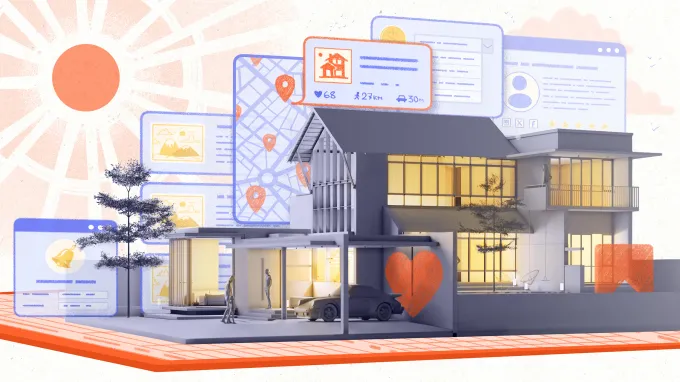AI solutions
What we do
Services
Experts in
How we work
Picture a tool that tracks every lead, listing, and client interaction so agents can close deals instead of drowning in spreadsheets.
That’s a real estate CRM — a customer relationship management system where each feature is tailored to the real estate industry. It keeps everything organized: contact info, properties, emails, follow-ups, deal stages — whatever you need, all in one place.
And it’s not just for agents. Marketing teams and even the C-suite can get value from it.
The right CRM can transform how your whole team works; we’ve seen it while providing real estate software development services for over 10 years. As a CRM software development company, we’ve worked on a range of custom real estate solutions, including CRMs. Clutch has even recognized us as a top Ukrainian IT services company for real estate. So, we know a thing or two about industry-specific tools.
Let's break down the topic of real estate CRMs:
At first glance, a CRM is a CRM, right? But when it comes to real estate–specific needs, working with a general-purpose CRM can feel like trying to fit a square peg into a round hole. Here’s why:
General-purpose CRMs work for many but fit perfectly for just a few — and those are rarely real estate businesses.
Managing real estate deals involves juggling people, properties, timelines, and myriad approvals and documents. For those managing rental portfolios, rental property management software development offers tailored solutions to handle tenant interactions, lease agreements, and maintenance requests efficiently.
That’s where a real estate CRM comes in. It covers common functions like lead management, analytics, and collaboration but also covers the specifics that general-purpose CRMs just don’t. For example:
Generic CRMs don’t have a built-in way to manage property databases. But real estate CRMs do. They let you link listings to clients, track statuses (like “available” or “under contract”) and price changes, and view showing histories.
Real estate agents are not the only ones who use a CRM; marketers, the C-suite, administrators, and many others often need to access it too. But the thing is, each user group needs different permissions, which can be tricky to configure in generic CRMs. When you use real estate CRMs, it’s easy to set up industry-specific roles and permissions — the system is designed for this.
Real estate deals go through property matching, showing, inspection, offer negotiation, financing, and many other stages. Functionality in real estate CRM systems fits how deals actually progress, making it easy for agents to track and coordinate each step or action. In general-purpose CRMs, you’ll need to configure this yourself, but some process configurations might still be missed.
In real estate, leads come from referrals, online listings, social media, and many other places. If your tool doesn’t gather data from all sources, you risk missing prospects and losing efficiency. Real estate CRMs let you integrate with all of these sources, including most real estate platforms. In general-purpose CRMs, many industry-specific websites are out of reach.
Real estate agents need tools for scheduling property showings, tracking availability, and sending reminders to clients, but these are things that general-purpose CRMs can’t handle without heavy customization.
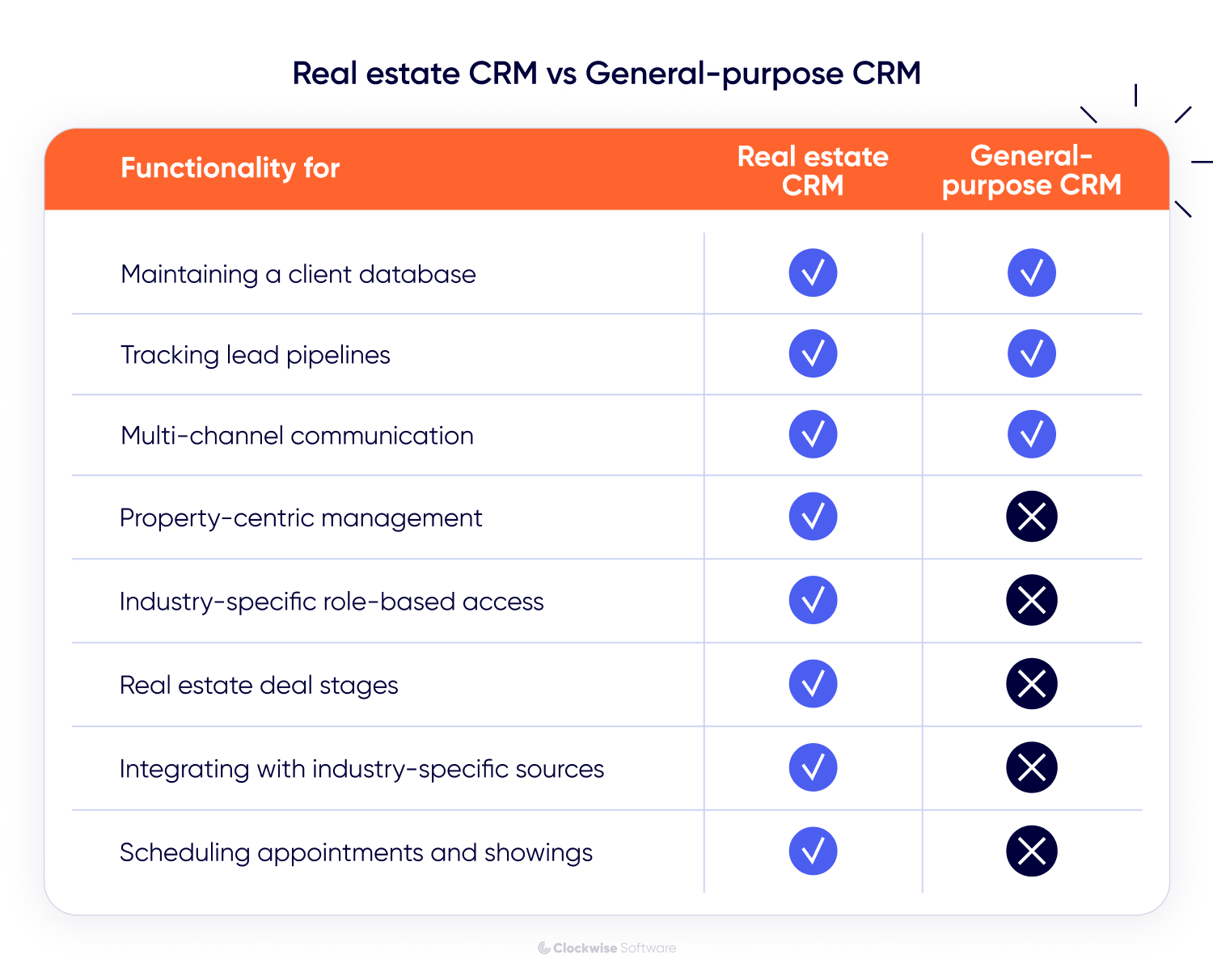
There are many other needs that one-size-fits-all CRMs don’t cover. Sure, with enough customization and integrations, you can make a generic CRM handle all this. But it takes time, money, and effort, and the result still won’t be as smooth as a tool built specifically for real estate.
To sum up, a real estate CRM benefits industry players in several ways:
Real estate agencies need a system that understands the complexity of what they do and reflects the way their businesses work without the need for lengthy configuration. That’s why real estate CRMs exist and win over users.
Let’s take a closer look at CRMs in real estate. What features make these tools great?
Here’s a breakdown of the key features a CRM in real estate offers and what processes it covers.
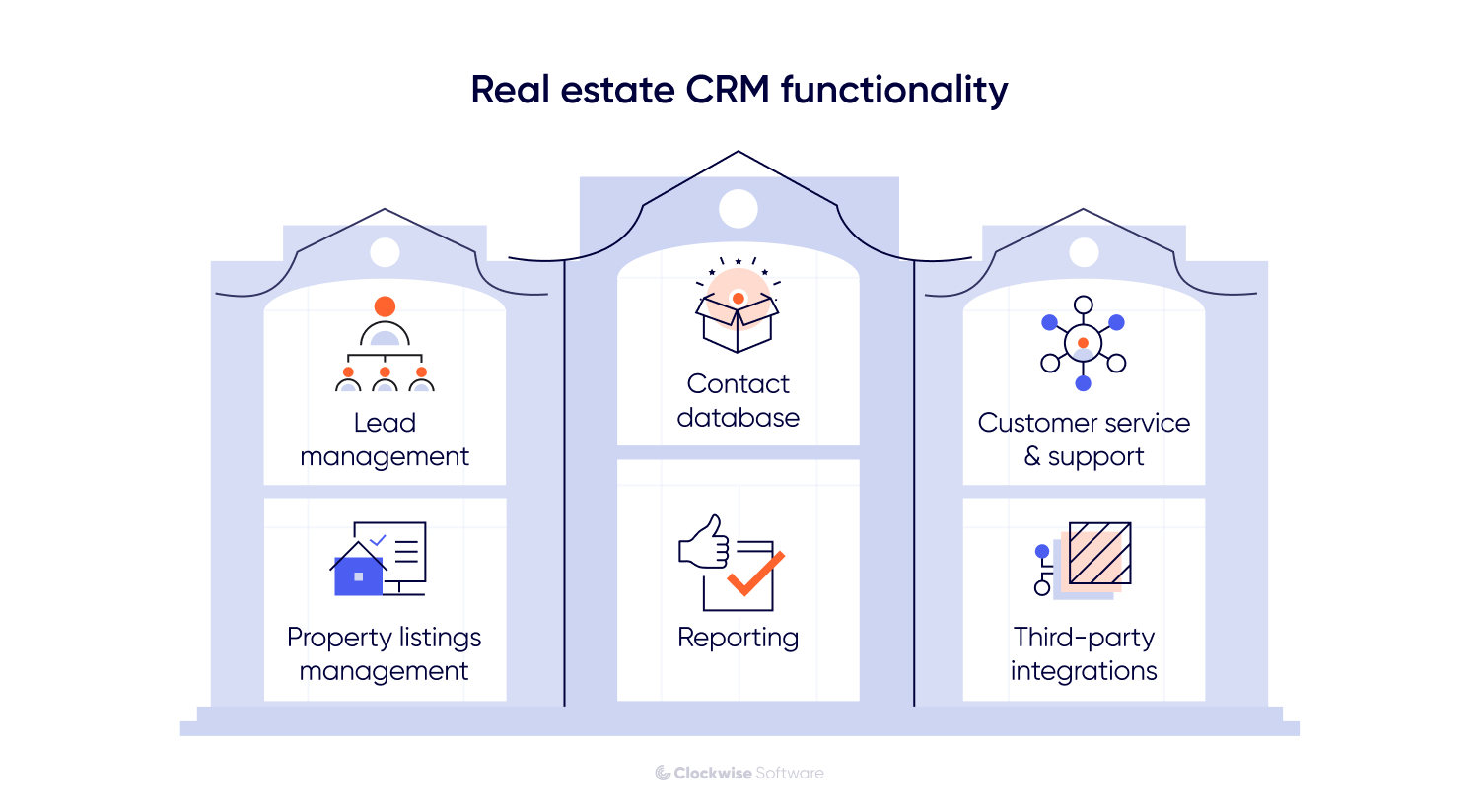
A good CRM doesn’t just collect leads; it helps you organize and nurture them. Here’s what functionality a real estate CRM offers for lead management:
Take, for example, the custom platform we built for real estate company StoneBay. We created a Leads module that stores all lead profiles and a Kanban board for tracking deal statuses. Everything was tailored to the client’s workflows, automating certain routine tasks for their team and creating a one-stop hub for lead management.
This CRM functionality is a centralized hub for every property your company manages. It includes:
Real estate is all about relationships, so keeping your contact list organized is a must. A CRM gives you a unified database with all your contact profiles.
With a CRM in real estate, you don’t need to guess who’s who or whether you’ve interacted before — just click on a contact and see who they are, what deals or properties they’re linked to, and how you (or other agents) last connected with them.
Engaging with customers is a core task of any agent; here’s how a CRM supports it:
This is where you spot trends and make data-driven decisions. A CRM organizes and displays various data, such as:
A CRM shouldn’t be a standalone tool; it needs to connect with other tools to serve its purpose.
Do you create listings on real estate platforms like Zillow or Realtor.com? A real estate CRM can easily integrate with them. The same goes for social media and email — sync with whatever lead sources you have.
Multiple listing services are also on the list. Real estate CRMs can sync with MLSs so that your property listing information is up to date everywhere.
But the necessary integrations don’t stop here. A CRM in real estate industry should also let agents connect with their calendar to manage schedules, connect with accounting software and commission calculators to track commissions, and interface with many other tools.
Tech is moving fast, and digitalization in real estate is gaining momentum. Modern CRMs have started to offer advanced features that make agents even more efficient.
Here are a few real estate tech trends:
Virtual tours. These gained popularity in COVID times and stuck around because they’re convenient for both prospects and agents. Now, some CRMs let users upload and share 3D property walkthroughs.
E-signatures. This feature lets agents forget about printing and scanning. Clients can sign documents digitally with e-signatures, and then the signed documents are automatically pulled right into the CRM.
AI-powered recommendations. Having AI help you predict what properties have a high likelihood of selling in the near future can be highly valuable — just ask Compass agents, who increased their commission revenue by 100% with this feature.
There are other AI use cases that let real estate teams focus on engaging with clients instead of tackling non-core tasks: for example, automating the writing of listing descriptions. Or automating lead segmentation, which can be a game-changer for businesses with a large client database. When leads are sorted, it’s easy to target each group with special offers, increasing the efficiency of marketing and sales campaigns. We’ve worked on a marketing tool called Segment AI that does this.
Data enrichment. Let your system automatically fill gaps in client profiles using data that is publicly available or pulled from social media. In this way, you can get complete information about prospects without wasting hours on data gathering.
When you piece all the features together — lead management, property listings, contact databases, and others — it’s clear that a CRM in real estate is like a full-time assistant.
How can you get one? That’s what we’re going to explore next.
Basically, there are two ways you can go: use an off-the-shelf solution or build a custom one. Let’s first explore what ready-made CRMs exist for real estate companies.
Today, the real estate CRM market has no shortage of options. But not all of them are worth your attention. Let’s cut through the noise and look at 5 of the top off-the-shelf CRM systems for the real estate industry.
BoomTown is known among real estate pros as a one-stop hub for agents, brokers, and real estate marketers. It combines functionality for lead generation and management, marketing automation, and IDX website integration.
Why BoomTown is great:
Downsides:
Who it’s best for: Midsize to large brokerages that have a budget to invest in a premium all-in-one tool for capturing, nurturing, and converting leads.
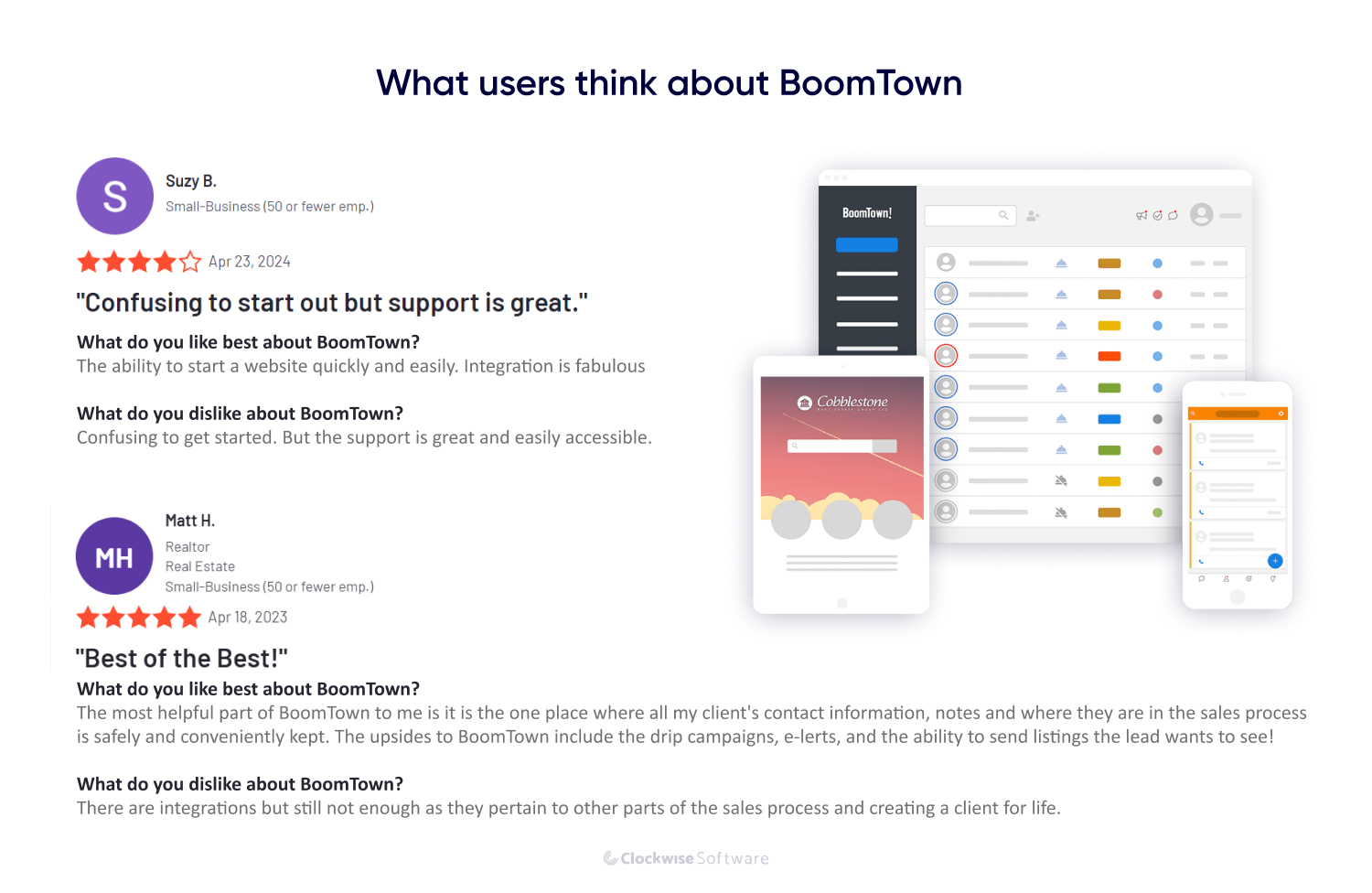
Follow Up Boss focuses on streamlining lead management and communication. If you need to integrate with lead sources like Zillow, Realtor.com, and Facebook ads, this tool is for you.
Why Follow Up Boss is great:
Downsides:
Who it’s best for: Teams and agents that need a tool purely for lead management and follow-ups and value a clean and organized interface.
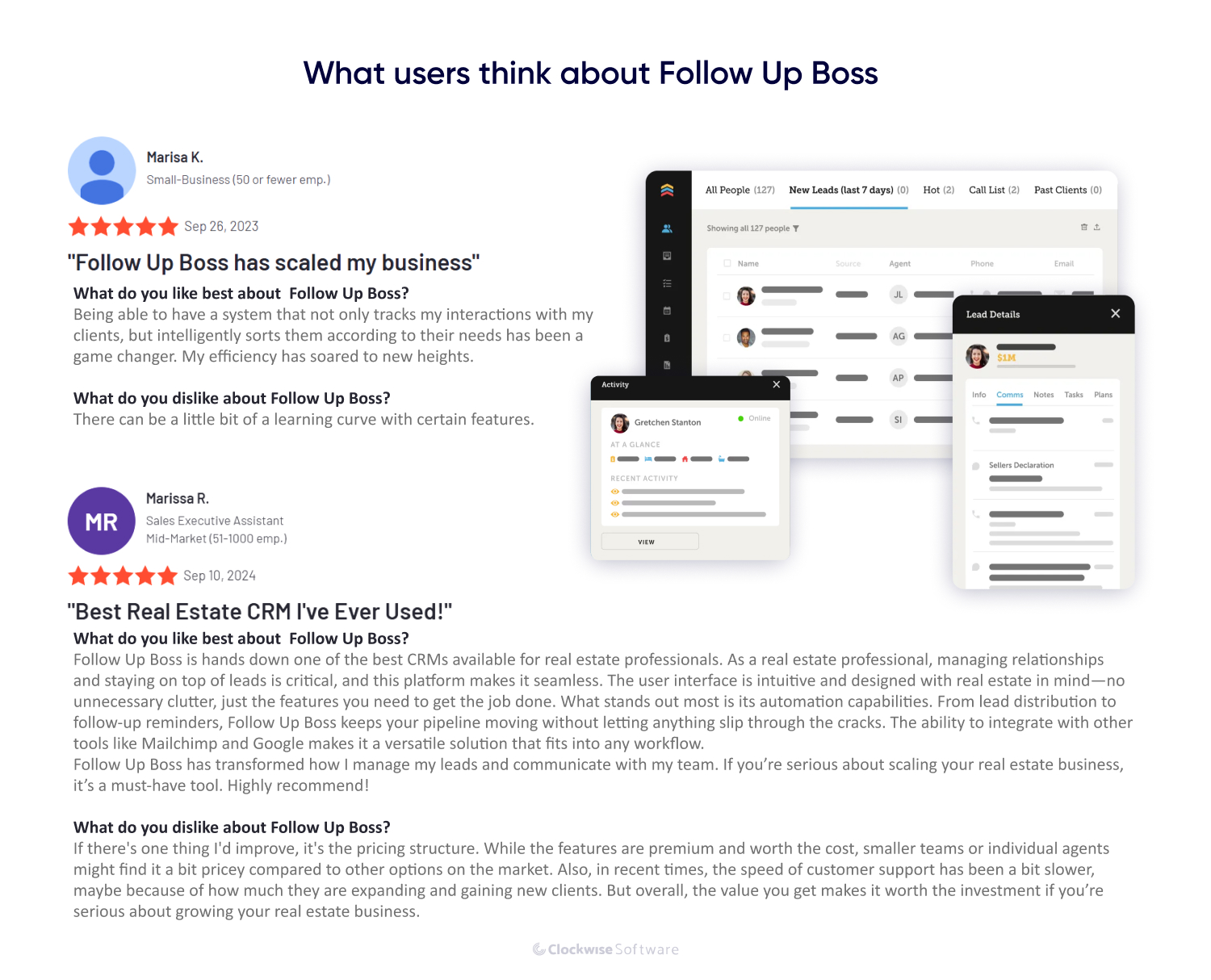
Wise Agent is a trusted platform that may not have the flashiest interface but is packed with useful features. Not to mention its price — it’s hard to argue with the value.
Why Wise Agent is great:
Downsides:
Who it’s best for: Solo agents or small teams looking for a budget-friendly CRM
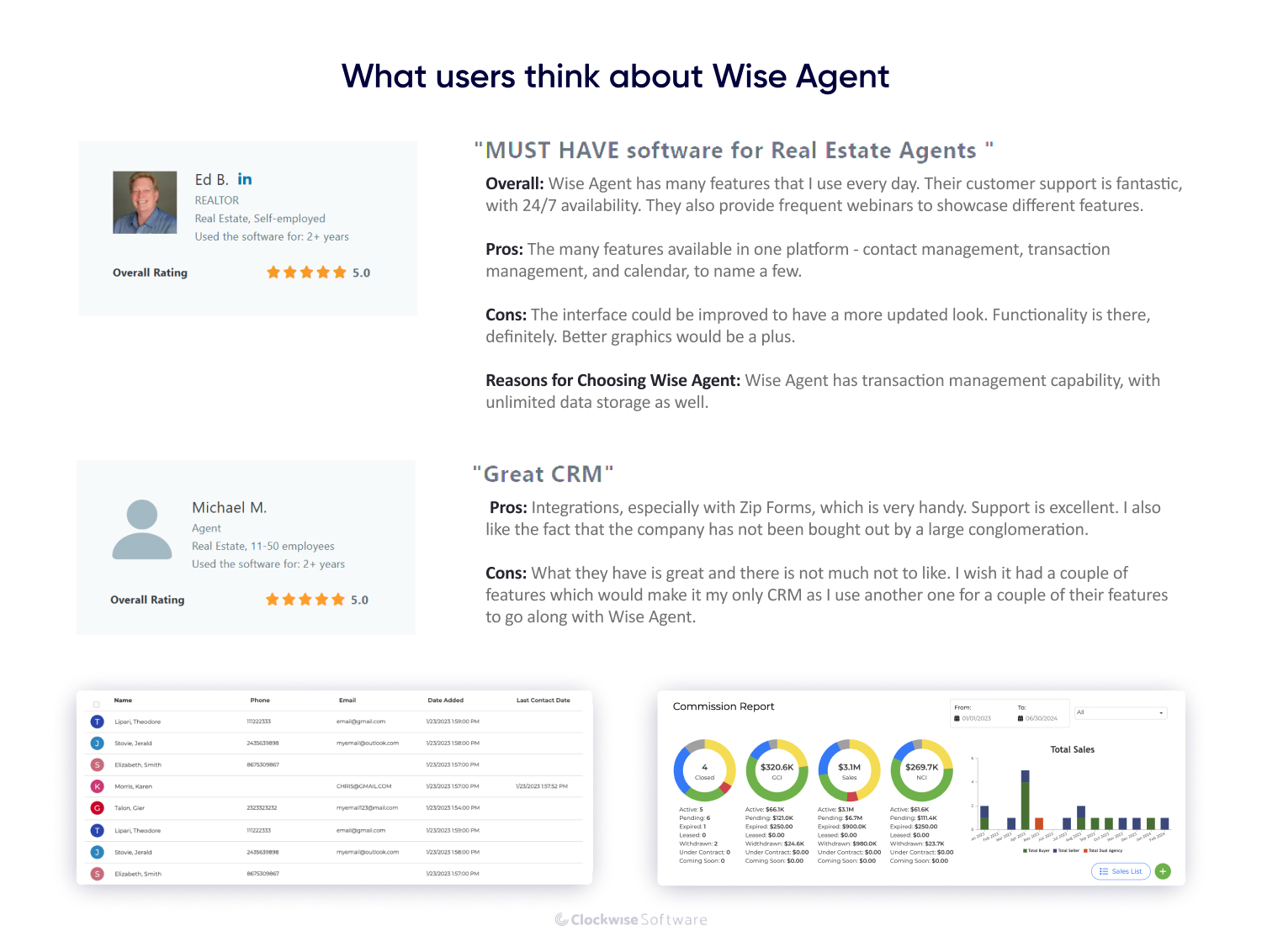
Lofty (formerly Chime) is a next-gen CRM in real estate known for its AI-driven tools for lead generation, marketing, and transaction management.
Why Lofty is great:
Downsides:
Who it’s best for: Teams that are looking for advanced functionality and AI tools for their business.
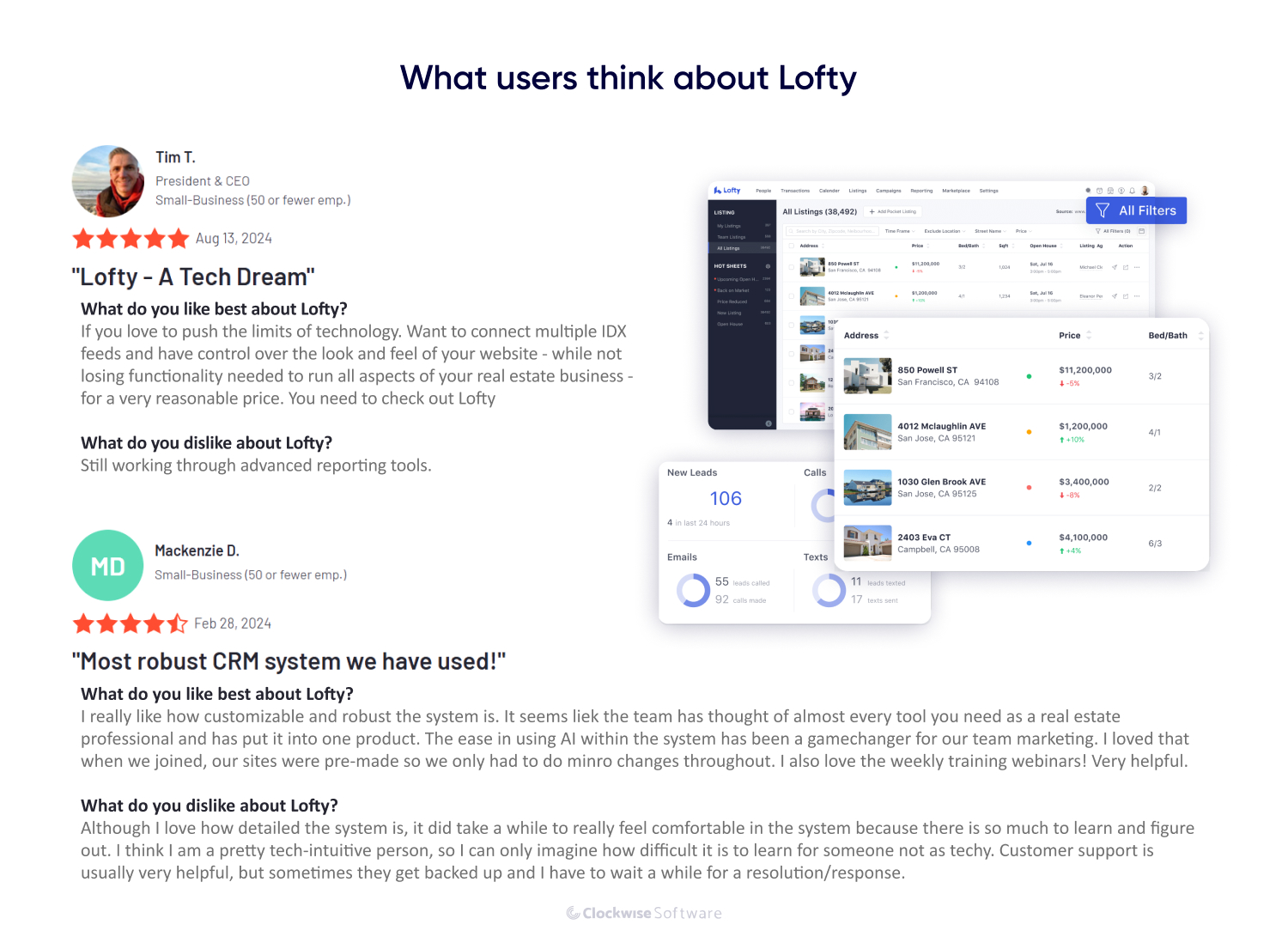
If most of your leads come from Zillow, Zillow Premier Agent CRM makes sure you can capture and manage them with zero problems. But outside Zillow? It’s not as versatile.
Why Zillow Premier Agent CRM is great:
Downsides:
Who it’s best for: Agents that mostly invest in Zillow for their leads and don’t focus on any other lead sources.
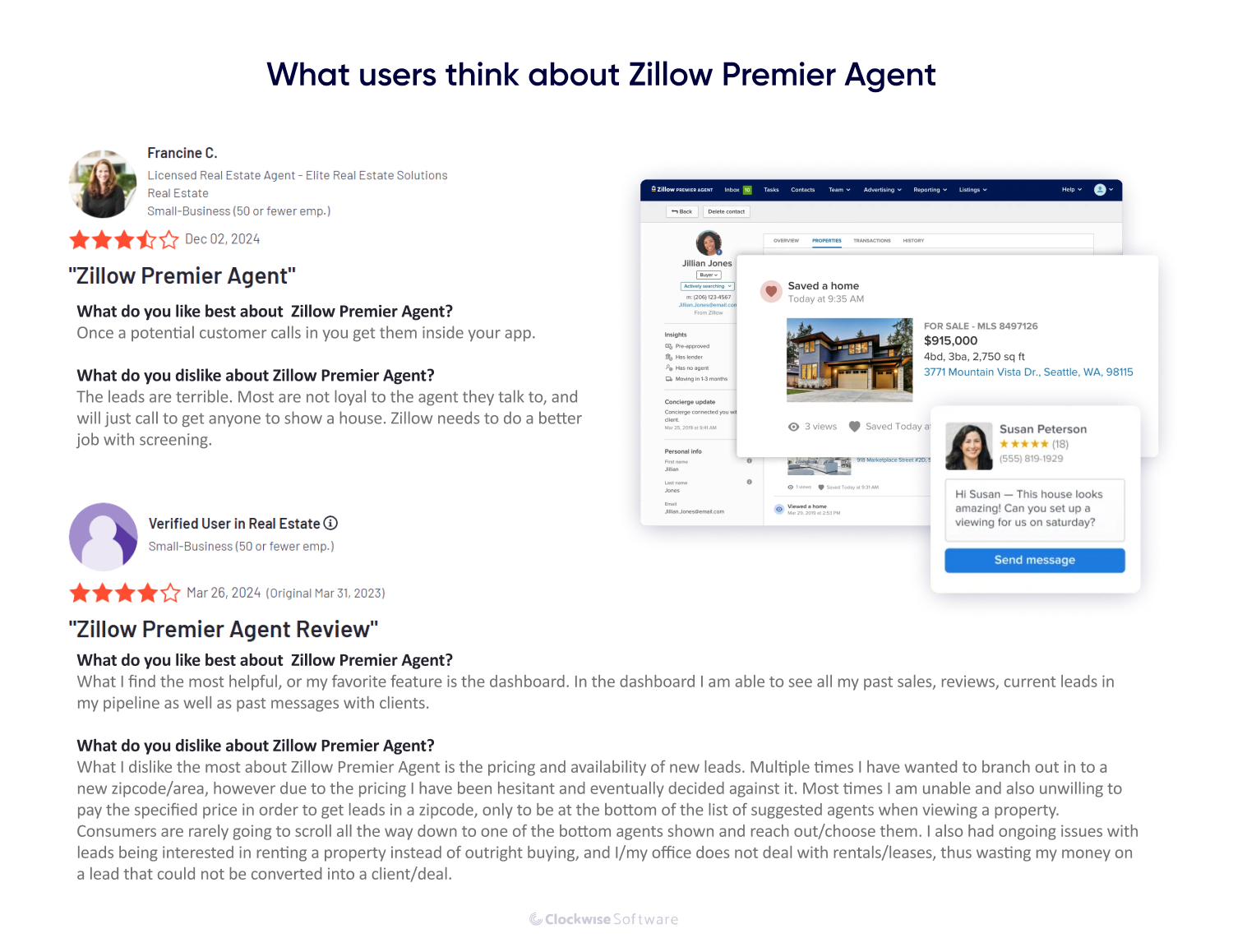
We’ve gone over some great off-the-shelf CRMs — they’re tried and tested and can work out great for real estate teams. But they may not be the perfect fit for you. So let’s look at another option: a custom real estate CRM system.
What if none of the ready-made CRMs tick all the boxes for your team? Maybe you’ve got unique workflows or specific integrations that none of the tools provide.
That’s when a custom CRM comes into play — and that’s where a real estate CRM software development service can help you build exactly what your business needs.
Here are a few reasons why a custom CRM might be a better fit for real estate teams:
You are in charge of deciding what to add to your CRM and what to skip. All functionality is tailored to how you work, and you won’t have to deal with features that don’t help your business and only distract your team.
The interface of your custom CRM can fully match your needs and habits: the whole design —** **every tab, every button — can be created for easy navigation. And you can customize the CRM over time if your preferences change.
A custom CRM evolves with you. Scalability is taken into account from the start, so you don’t need to worry about feeling stuck with a poor tool over time. Need new features? No problem. Scale your platform as your business grows or your market changes.
You own the code, the data, and the system. You’re not tied to a vendor or forced into their upgrade cycle.
Do you think other teams could benefit from your platform? You can turn it into a SaaS product and provide it for a monthly subscription.
If any of these benefits resonate with you, it’s probably a sign that developing custom software is the right option for you. In this case, you might want to know more about building it. We have some insights for you.
First, let’s talk numbers. Custom CRMs can be a larger upfront investment than off-the-shelf solutions, but the value they bring over time can outweigh the cost.
On average, building a CRM will cost around $100,000 but can go higher depending on the complexity of the functionality you need.
You can start by building a minimum viable product (MVP) — it’s one of the best ways to optimize the cost of software development. With this approach, you first build a tool with a few core features, launch it, test it with your team, and then improve it over time. This way, you manage many software development risks at once and secure yourself from investing a large sum into a tool that hasn’t gone through real-life validation.
Here’s what stages of software product development you should expect when deciding to build a custom real estate CRM:
This is where you explore your idea and define your solution in detail. Project discovery is a must for smooth development, and we say this as a team that has built over 200 products.
At the end of the project discovery stage, you’ll have a full description of your CRM in an app requirements document, a UI design concept, an architectural design, a detailed development plan, and cost and timeline estimates.
Knowing the scope of work, you can gather a development team that will bring your idea to life. If you don’t have an in-house tech team, the best option is to outsource software development to a vendor. You will get all the specialists you need, from a project manager to developers and QA engineers, to cover the entire software development lifecycle. There’s also an option to hire dedicated developers if you have an in-house team but lack some specialists to start the project.
Here’s where coding, integration, testing, and deployment happen. The development stage ends with a fully functioning CRM that your team can use.
As you can see, the process of developing a custom CRM is straightforward, especially if managed by a team that has done it before. Yes, it takes longer than subscribing to an off-the-shelf option, but the benefits a custom CRM brings are worth it.
If someone asked us, What is CRM in real estate? we would say it’s like a super organized assistant who knows exactly what real estate agents and marketers need and makes their work way easier.
Today, there’s a wide pool of real estate–specific CRMs out there. You won’t need to spend days fighting with settings to make a CRM fit your real estate workflow — real estate CRMs already have everything configured for the industry. They are not without flaws, but one of them could be exactly what your business needs.
And if none of the off-the-shelf options work for you, you can always go custom. In this case, you should start with a project discovery stage to plan every detail of your tool and understand what it will take to build the desired CRM.
We can help you with this task. We’ve worked with many real estate businesses, creating custom CRMs, property management platforms, and other tools. If you’ve got an idea, we can help you turn it into a plan and, eventually, the CRM you’ve been looking for.
